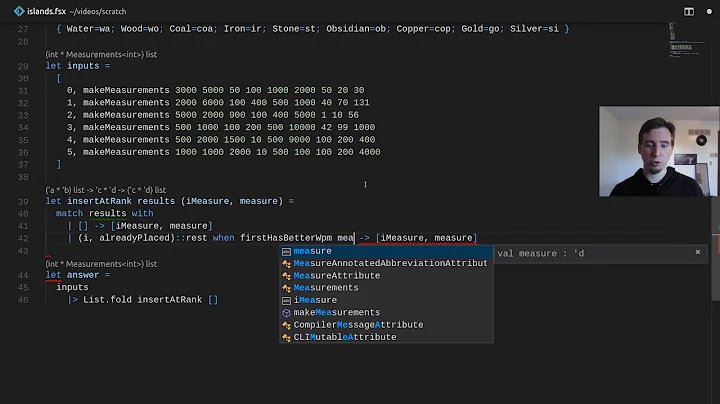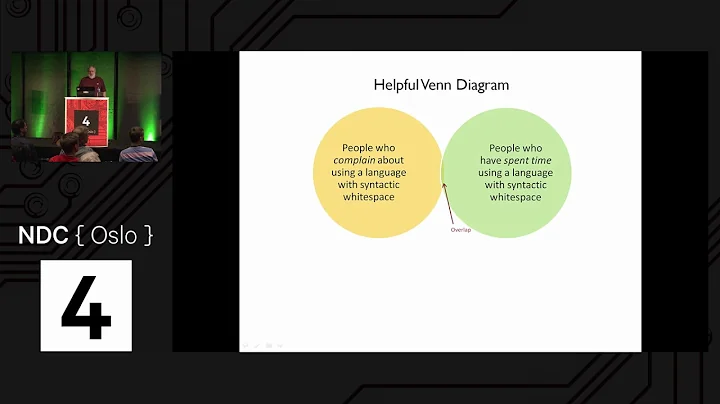In F# what does the >> operator mean?
Solution 1
It's the function composition operator.
More info on Chris Smith's blogpost.
Introducing the Function Composition operator (>>):
let inline (>>) f g x = g(f x)Which reads as: given two functions, f and g, and a value, x, compute the result of f of x and pass that result to g. The interesting thing here is that you can curry the (>>) function and only pass in parameters f and g, the result is a function which takes a single parameter and produces the result g ( f ( x ) ).
Here's a quick example of composing a function out of smaller ones:
let negate x = x * -1
let square x = x * x
let print x = printfn "The number is: %d" x
let square_negate_then_print = square >> negate >> print
asserdo square_negate_then_print 2
When executed prints ‘-4’.
Solution 2
The >> operator composes two functions, so x |> (g >> f) = x |> g |> f = f (g x). There's also another operator << which composes in the other direction, so that (f << g) x = f (g x), which may be more natural in some cases.
Solution 3
The composition operators, << and >> are use to join two functions such that the result of one becomes the input of the other. Since functions are also values, unless otherwise note, they are treated as such so that the following expressions are equivalent:
f1 f2 f3 ... fn x = (..((f1 f2) f3) ... fn) x
Specifically, f2, f3, ...fn and x are treated as values and are not evaluated prior to being passed as parameters to their preceding functions. Sometimes that is what you want but other times you want to indicate that the result of one function is to be the input of the other. This can be realized using the composition operators << and >> thus:
(f1 << f2 << f3 ... << fn) x = f1(f2(f3 ... (fn x )..)
Similarly
(fn >> ... f3 >> f2 >> f1) x = f1(f2(f3 ... (fn x )..)
Since the composition operator returns a function, the explicit parameter, x, is not required unlike in the pipe operators x |> fn ... |> f1 or f1 <| ... fn <| x
Solution 4
According to F# Symbol and Operator Reference it is Forward Function Composition operator.
Solution 5
That is function composition, used for partial application
Related videos on Youtube
Russell
I am an Architect and Senior developer based in Adelaide. I love learning, mentoring and contributing to the development community. You can find me on Twitter @RussLescai.
Updated on August 07, 2020Comments
-
Russell over 3 years
I noticed in some code in this sample that contained the >> operator:
let printTree = tree >> Seq.iter (Seq.fold (+) "" >> printfn "%s")What does the >> operator mean/do?
EDIT:
Thanks very much, now it is much clearer. Here's my example I generated to get the hang of it:
open System open System.IO let read_lines path = File.ReadAllLines(path) |> Array.to_list let trim line = (string line).Trim() let to_upper line = (string line).ToUpper() let new_list = [ for line in read_lines "myText.txt" -> line |> (trim >> to_upper) ] printf "%A" new_list-
cfern over 14 yearsYou can even be more concise now: ... let new_list2 = read_lines "myText.txt" |> List.map (trim >> to_upper) ... This is the form in which I write data processing myself.
-
Russell over 14 yearsAwesome, so I could turn it into : let new_list2 = File.ReadAllLines(path) |> Array.map (trim >> to_upper) ... very neat :) thanks
-
cfern over 14 yearsSee, you're learning already :)
-
Russell over 14 yearshehe yep thanks :) I am finding it a very interesting experience learning the functional paradigm coming from a OO paradigm background.
-
codebliss over 14 yearsmap f >> map g = map (f >> g). And the latter is faster.
-
Prakash about 14 years
-
-
 JonathanPeel about 3 yearsFor us coming from OOP, looking at this makes heads hurt, but then I realse I can replace
JonathanPeel about 3 yearsFor us coming from OOP, looking at this makes heads hurt, but then I realse I can replace(fun x -> x |> Entry.nv |> SetFirstName |> dispatch)with(Entry.nv >> SetFirstName >> dispatch)and F# just continues to impress.


![Introduction to Functional Programming with F# - Part 1 [Episode 001]](https://i.ytimg.com/vi/Teak30_pXHk/hq720.jpg?sqp=-oaymwEcCNAFEJQDSFXyq4qpAw4IARUAAIhCGAFwAcABBg==&rs=AOn4CLBi0C7aJ-e-67vM3Kn6SkrzjyzABw)






